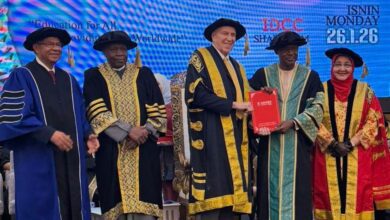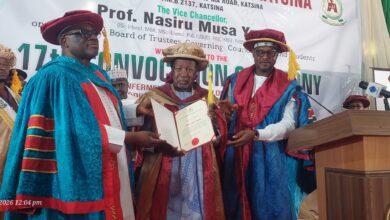FG To Reduce Cost Of Governance, Launches SPESSE Project In Varsities

The Federal Government has launched the World Bank-supported Sustainable Procurement, Environmental and Social Standards Enhancement (SPESSE) Project, in six universities chosen as Centres of Excellence.
Vice-President, Prof. Yemi Osinbajo, who was represented by the Minister of State for Education, Hon. Chukwuemeka Nwajiuba, chaired the launch on Thursday, October 28, 2021in Abuja.
TheFact Nigeria gathered that the cost of governance in the country was far higher than those of other countries.
Prof. Osinbajo noted that a lot of financial resources went into the processes of procurement which push the cost of governance higher and because of lack of procurement specialists, this encouraged financial waste.
He said procurement, environmental and social standards, had assumed a huge dimension which brought to the fore that issues related to public health, sanitation, reduction in human contribution to global warming, gender equality and encouragement of the social protection of natural resources and the environment needed to be enhanced.
The Vice President stated that the project which sought to address training, professionalisation and research in procurement, environmental and social standards, through certification, undergraduate, graduate and postgraduate studies underscored the objectives of the SPESSE.
He said good procurement practice occupied the front burner of President Muhammau Buhari administration which it was working to preserve through prudent financial management and encouragement of local content in contract execution.
He said Nigeria must get its public procurement procedure right with the Economic Recovery and Growth Plan (ERGP) initiative as well as the SPESSE so as to help government to reduce its cost of governance.
He acknowledged the use of quality framework in the selection of the six centres along with geo-political considerations, expressing his elation that women were given due consideration by setting aside at least 30 per cent admission quota for them which signposts the place of women in the economic growth of a nation.
Prof. Osinbajo posited that job creation and youth empowerment was part of the key features of the project, which encapsulate the present government’s Economic Recovery and Growth Plan (ERGP) which would both, help to support governance, increase transparency, competition, equal opportunity, sustainability as well as environmental and social standards.
The Minister of Education, Mal. Adamu Adamu, who was represented by the Permanent Secretary, Federal Ministry of Education, Arc. Sonny Echono, expressed delight that the little seed sown in the area of procurement was yielding much fruit in Nigeria championed by the Project Task Team Leader at the World Bank, Chief Bayo Awosemusi.
He said Nigeria must utilise such a platform afforded it by the Bank to produce the right kind of personnel that would take charge of its procurement.
Executive Secretary of NUC, Professor Abubakar Adamu Rasheed, expressed a sense of fulfillment on the launch as he described the journey to the project as a long drawn and painstaking one that began in December 2018 at the Commission, with several other meetings, consultations and due process leading to the consummation of the project.
He said that the approval by the National Assembly for the disbursement of funds in July 2021, was the latest success recorded which, he added, culminated to the eventual assurance that the project had finally navigated the path towards producing a critical mass of professionals in the field of procurement, environmental and social standards.
He stated that the project was Nigeria’s first attempt at institutionalising the much needed sustainable and crediblequalification framework in the field of procurement, environmental and social standards, that would be offering professional and academic programmes in such a sustainable and fit-for-purpose manner.
According to him, the momentous SPEESE project was one that had the capacity to generate multiplier effectacross Nigeria’s economy with the production of professionals whose promises no doubt indicated that there would be proper management and effectiveness in service delivery in public expenditure.
He noted that though the project was originally designed to be a four-year programme (between 2020 and 2024), there was however, some hiccups including the Covid-19 pandemic. He pointed out that although the Centres might be behind schedule, he was convinced that with the present level of their commitment and determination the goals and objectives of the project would be met.
The target, he disclosed was to train about 25, 240, out of which initial students would be drawn from Ministries Departments and Agencies (MDAs), federal universities and regulatory agencies as well as organised private sectors and contractors, foreign universities and training institutions, including from the professional bodies like Council for Regulation of Engineering (COREN), Auditors Registration Council and non-state actors like the Nigerian Economic Summit Group (NESG) and Nigerian Governors Forum (NGF).
The NUC had already developed the needed programmes and had approached the Joint Admissions and Matriculation Board (JAMB) for the purpose of the six universities advertising and commencing admission next year.
In his remarks, the Country Director, World Bank, Mr. Shubhan Chav, who spoke via online, commended Nigeria for recognising the importance of funding the critical project of SPESSE which he described as very inspiring to the Bank.
He added that the issue was beyond just teaching people at the brick and mortar environment, but focusing more on reevaluating the human capital whether they had the capabilities required to deliver on the needs of people.
The six federal universities selected to host the SPESSCEs include; Abubakar Tafawa Balewa University, (ATBU), Bauchi; Ahmadu Bello University (ABU), Zaria; Federal University of Agriculture, Makurdi (FUAM); Federal University of Technology, Owerri (FUTO); University of Benin (UNIBEN) and University of Lagos (UNILAG).





